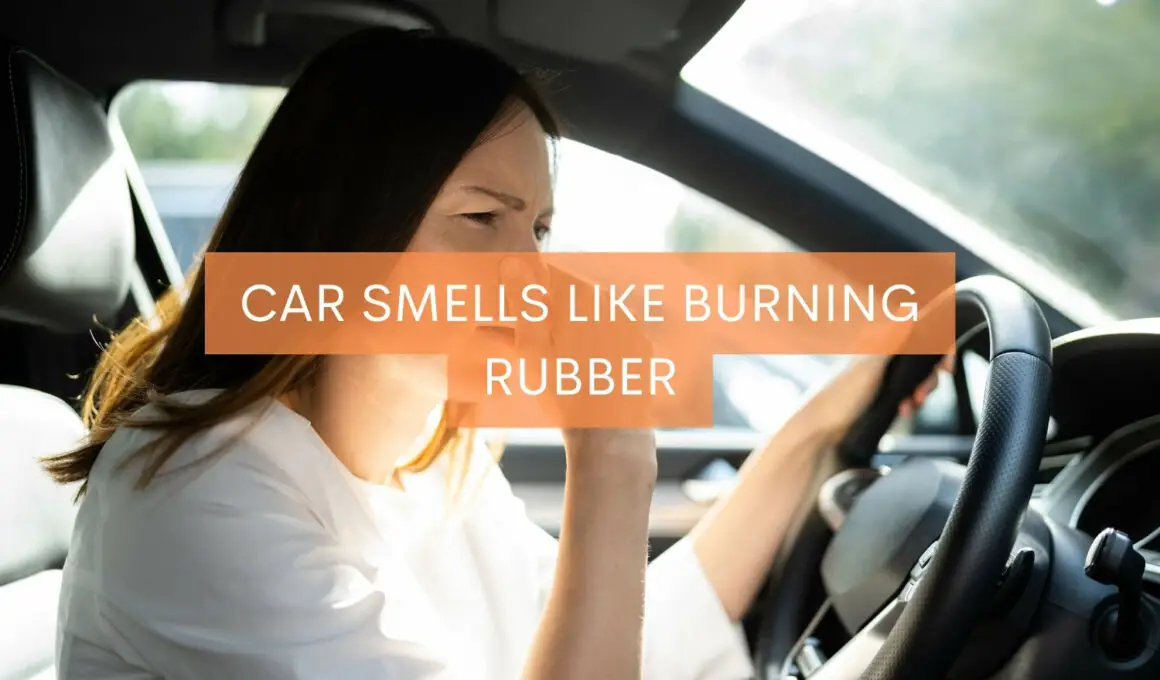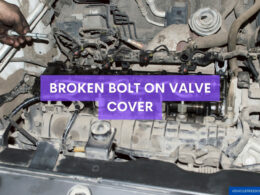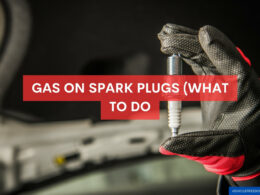In This Article Show
As a professional mechanic with over 13 years of hands-on experience in the industry, I’ve encountered many car issues. Some problems have straightforward signs – a flashing check engine light or a strange knocking sound. But one telltale symptom often leaves car owners scratching their heads – a burning rubber smell emanating from their car.
This scent can be quite unsettling, and rightfully so. It’s rarely a false alarm or a sign that something within your vehicle needs immediate attention. It’s a smell that can’t be ignored, nor should it be. But what exactly causes this unusual odor, and how do you fix it? This is what I aim to answer in this blog post.
Having encountered and rectified this issue countless times in my mechanic career, I’ll use my expertise to shed light on this problem, breaking it down in an easy-to-understand manner.
Understanding the Smell of Burning Rubber in Cars
If you’ve ever smelled burning rubber in your car, you know it’s not a pleasant experience. More than that, it’s a sign that there’s something not quite right under the hood or elsewhere in your vehicle. When something in your car is not functioning correctly, heat and friction can cause various materials, including rubber components, to emit this distinctive smell.
The smell of burning rubber can originate from different parts of your vehicle, and it’s a warning sign that shouldn’t be dismissed. Ignoring it can lead to more severe and potentially dangerous problems, including fire risk.
Understanding the root cause and taking the necessary steps to rectify the issue promptly is essential.
In my 13 years of professional experience as a mechanic, I have found that immediate attention to such issues can save you from costly repairs in the future. The burning rubber smell is an alert, a call to action for you to diagnose and address the problem. It’s a scent that calls for action – let’s explore what actions you need to take.

Potential Causes of the Burning Rubber Smell in Cars
The smell of burning rubber in your vehicle can stem from a variety of issues. Each cause has its own set of unique symptoms and requires a different approach to resolve. Let’s delve into the potential culprits:
1. Oil Leaks
An oil leak might be responsible for the unpleasant scent you’ve been noticing. When motor oil drips onto hot engine parts, it can cause a smell similar to burning rubber. Signs of an oil leak may include oil stains under your car or an unusually low oil level.
2. Loose or Damaged Rubber Hoses
Your car has several rubber hoses carrying various fluids. If these hoses are loose, damaged, or misaligned, they can come into contact with hot parts of the engine and start to burn, thus producing the burning rubber smell.
3. Stuck Clutch
If you drive a manual transmission vehicle, a stuck clutch could be the source of the smell. When the clutch faces excessive friction, it can produce a scent similar to burning rubber. If you notice the smell after shifting gears or if shifting becomes difficult, your clutch might be the culprit.
4. Burning Belts or Wires
Belts and wires in your car are susceptible to wear and tear. If they get worn out and begin to slip or rub against other components, the resulting friction can create a burning smell.
5. Brake Issues
Problems with the brake system, like a dragging brake pad or a stuck brake caliper, can create excessive heat and give off a burning rubber smell. If you notice the smell when you brake or feel that your car is not stopping efficiently, your brakes might need attention.

6. Overheated Tires
Sometimes, the issue might be as simple as an overinflated tire. Overinflation increases friction, causing your tires to overheat and emit a burning smell.
Diagnostics: Identifying the Source of the Smell
Identifying the source of the burning rubber smell in your car can be tricky. It requires a thorough inspection and a keen eye for detail. As someone with over 13 years of professional experience in the mechanic field, I can tell you that diagnosing the issue correctly is the first step towards an effective solution.
Here are some steps to help you identify the problem:
1. Inspect for Oil Leaks
Check under your vehicle for any signs of oil leakage. Look for oil stains on your parking spot or drips hanging from the underside of your car. Also, make it a habit to monitor your oil levels.
2. Check Rubber Hoses
Examine the rubber hoses in your car’s engine bay. Ensure they are secure, intact, and not making contact with any hot parts of the engine.
3. Assess the Clutch
If you drive a manual vehicle and suspect the clutch, try to notice any changes in the clutch’s operation. If the smell appears when you change gears or if the clutch feels harder or softer to press, these could be signs of a clutch issue.
4. Examine Belts and Wires
Look for signs of wear and tear on the belts and wires in your engine bay. Frayed wires or belts that look glossy or have missing pieces could be signs they need replacement.

5. Evaluate the Brakes
Pay attention to your car’s braking performance. If the car pulls to one side when you brake, or if it doesn’t stop as efficiently as before, it might be time to check your brake system.
6. Check the Tires
Ensure your tires are correctly inflated. Too much pressure can lead to overheating and a burning smell.
Remember, while these steps can help you diagnose the problem, certain issues might require the tools and expertise of a professional mechanic. If you can’t identify the source or if the problem persists, don’t hesitate to seek professional help.
How to Fix a Car That Smells Like Burning Rubber
Once you’ve identified the source of the burning rubber smell, it’s time to address the issue. Depending on the problem, some fixes may be simple enough to handle on your own, while others may require professional intervention. Let’s go through potential fixes for each cause:
1. Fixing Oil Leaks
Small leaks can sometimes be fixed with engine oil stop-leak additives, but these are temporary solutions. For larger leaks or if the problem persists, it’s best to get the leak professionally repaired.
2. Addressing Loose or Damaged Rubber Hoses
If a hose is loose, securing it properly can resolve the issue. For damaged hoses, replacements are usually necessary. If you’re uncomfortable doing this yourself, your local mechanic can handle it.
3. Rectifying a Stuck Clutch
Issues with the clutch are often complex and typically need a professional’s touch. A mechanic can determine if it’s a matter of adjusting the clutch or if a replacement is necessary.
4. Repairing Burning Belts or Wires
To prevent further damage, damaged or worn-out belts and wires should be replaced promptly. This is a job that’s usually best left to the professionals.
5. Solving Brake Issues
Brake problems range from replacing worn brake pads to repairing a stuck caliper. These tasks require expertise and the right tools, so seeking professional help is highly recommended.
6. Addressing Overheated Tires
Ensure your tires are inflated according to the manufacturer’s recommended PSI. Regularly check tire pressure, especially during extreme weather conditions.
While it’s possible to perform some of these fixes yourself, keep in mind that safety comes first. If you’re unsure how to handle a repair, consult a professional mechanic.
Preventive Measures to Avoid Burning Rubber Smell in Cars
While it’s essential to address the burning rubber smell when it arises, preventing these issues in the first place is even more beneficial. Here are some preventive measures that can help you avoid encountering this problem:
Regular Maintenance
Keeping up with regular maintenance checks is crucial. These checks can help identify potential problems before they escalate, saving you both time and money. A professional mechanic can spot signs of wear and tear or small leaks that you might miss.
Early Diagnostics
If you notice any changes in your car’s performance or any unusual smells, don’t wait. Get it checked out immediately. Early diagnosis can prevent minor issues from becoming major problems.
Good Driving Habits
Your driving habits can significantly impact your car’s health. Avoid aggressive driving, such as rapid acceleration and sudden braking, which can cause excessive wear and tear.
Wrapping it up
A car that smells like burning rubber should never be overlooked. It’s a clear signal that there’s an issue demanding your attention. From oil leaks to loose hoses, a stuck clutch to burning belts or wires, brake issues, or overheated tires – we’ve covered a range of causes that could be the root of this peculiar smell.
Addressing these problems doesn’t just eliminate the odor, but it also prevents further damage to your vehicle, ensuring its longevity and performance.
Moreover, by implementing regular maintenance, early diagnostics, and adopting good driving habits, you can prevent these issues from cropping up in the first place.











